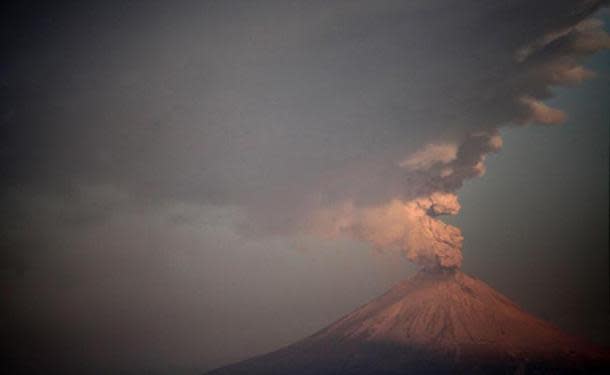 Science and Weather
Science and WeatherMexican volcano spews ash and lava after explosive eruption

Popocatépetl, the iconic-looking volcano to the southeast of Mexico City, has been in a pretty foul mood lately, and last night it apparently decided to throw a bit of a tantrum as it let off an explosive eruption, throwing molten rock out onto its slopes and spewing an ash cloud over 7 km high into the sky.
The volcano had already been emitting a steady stream of ash when the eruption took place at just after 8 p.m., local time, and went on for roughly 8 hours. Webcameras set up by the Mexican government to watch the volcano were running as "incandescent fragments" were thrown as far as 500 metres down the volcano's northeastern slope, according to an update from CENAPRED — Mexico's National Center for Prevention of Disasters.
[ Related: Breathtaking video captures amazing views of Earth from space ]
YouTube user Hugo Garcia compiled the CENAPRED feed into this frame-by-frame video, showing the eruption as it happened:
Ash rained down over the City of Puebla, to the east of the volcano, making it look like the area was being hit by a snowstorm. Due to the potential danger to aircraft from this ash, flights in and out of the Puebla airport have been suspended.
Local resident Alejandra Salcedo captured this video of the ash falling past a streetlamp in the city:
The Mexican government has their Volcanic Alert Level for Popocatépetl set at Yellow Phase 2, which it has been at for some time. This status warns that the volcano is active and informs the public to be prepared for a potential evacuation of the area, but it does not rank into the 'Alert' stage, that warns of imminent danger of a major eruption. Authorities are currently restricting access to within 12 kilometres of the volcano's crater, and controlling traffic on local roads.
[ More Geekquinox: Solar eclipse creates dazzling ‘ring of fire’ this week ]
Popocatépetl is a stratovolcano nearly 5.5 kilometres high, located around 70 km southeast of Mexico City, and it's the second tallest volcano in North America next to Citlaltépetl, about 150 kms to the east. Popocatépetl has a history of eruptions, with 15 major eruptions recorded in the last 500 years and many more minor eruptions. Scientists noted increased activity from the volcano back in January of 2012 and it has been fitful ever since.
There's no indication now that last night's explosive eruption is heralding a bigger eruption to come, but with one of the world's largest cities just a stone's-throw away, the Mexican government has the volcano under 24-hour surveillance to keep the the population safe.
(Image courtesy: Getty Images, CENAPRED/YouTube/Hugo Garcia)



